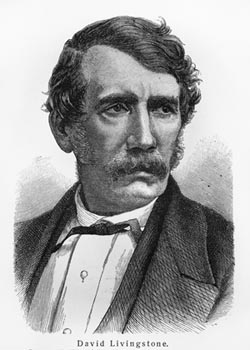Celebrating the life and legacy of David Livingstone
Published: 15 February 2013
The life and legacy of David Livingstone – the renowned Scottish explorer, missionary and scientist – will be celebrated at the University of Glasgow next week
The life and legacy of David Livingstone – the renowned Scottish explorer, missionary and scientist – will be celebrated at the University of Glasgow next week.
 The achievements of Blantyre-born Livingstone will be marked by a gathering of leading health experts from around the world on February 25 and on February 28 with a lecture delivered by Lord McConnell of Glenscorrodale, former First Minister of Scotland.
The achievements of Blantyre-born Livingstone will be marked by a gathering of leading health experts from around the world on February 25 and on February 28 with a lecture delivered by Lord McConnell of Glenscorrodale, former First Minister of Scotland.
The lecture will be introduced by Desmond Tutu, the former Archbishop of Cape Town and social rights activist who has recorded a special video message in which he pays tribute to the University’s collaborations with African universities and its continued research interests in diseases afflicting Africa.
Of Livingstone himself, he says: “Many Scots have been at the forefront of the struggle for justice and respect for humanity, particularly in Africa, and of course David Livingstone is the greatest of all the Scottish figures in these endeavours.”
While Livingstone is well-known for his explorations of sub-Saharan Africa, his famous encounter with journalist Sir Henry Stanley and his stance against slavery, he is perhaps less recognised for his pioneering medical research.
It was Livingstone who promoted quinine’s use to prevent and treat malaria, and who suggested that arsenic compounds might treat the diseases caused by tsetse fly bites. He observed that the presence of mosquitoes was linked to a higher prevalence of malaria and how ticks could transmit other fevers.
Now, as part of the celebrations marking Livingstone’s life, international experts from the World Health Organisation, Bill and Melinda Gates Foundation, St George’s University of London, Makerere University in Uganda and the University of Glasgow will discuss historical and contemporary issues surrounding health and infectious diseases in Africa within the context of the extraordinary life of Dr Livingstone.
Professor Mike Barrett, who is leading the symposium, said: “David Livingstone was able to survive in parts of Africa where other Europeans had not and much of this was down to the medical observations he made.
“He was an astonishing man. His observations on Africa’s wild-life, geography and its people put him on a par with someone like David Attenborough today. But he also did so much more. He was a devout Christian and pioneered in the fight against slavery. But it is Doctor Livingstone’s achievements as a medical practitioner and the influence he had on a generation of physicians who came in his wake that we will celebrate at the Glasgow symposium.”
The one day symposium is free to attend and will be held in the Bute Hall, University of Glasgow, on 25 February from 9:45am to 6pm.
The lecture by the Rt. Hon Lord McConnell of Glenscorrodale, entitled Livingstone’s Legacy: Lessons for Today, will also be held in the Bute Hall at 6:45pm on 28 February and is free to attend, though registration is required through the following link: http://www.gla.ac.uk/davidlivingstone2013lecture
You can also view the David Livingstone lecture flyer.
First published: 15 February 2013
<< Feb

